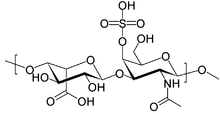Dermatan sulfate
 | |
| Clinical data | |
|---|---|
| AHFS/Drugs.com | International Drug Names |
| ATC code | |
| Identifiers | |
| CAS Number | |
| ChemSpider |
|
| UNII | |
| CompTox Dashboard (EPA) | |
| ECHA InfoCard | 100.042.305 |
| Chemical and physical data | |
| Formula | C14H21NO15S |
| Molar mass | 475.37 g·mol−1 |
| | |
Dermatan sulfate is a glycosaminoglycan (formerly called a mucopolysaccharide) found mostly in skin, but also in blood vessels, heart valves, tendons, and lungs.
It is also referred to as chondroitin sulfate B,[1] although it is no longer classified as a form of chondroitin sulfate by most sources. The formula is C14H21NO15S. This carbohydrate is composed of linear polymers of disaccharide units that contain, N-acetyl galactosamine (GalNAc) and iduronic acid (IdoA). These repeating units are sulfated at a variety of positions.[2] Dermatan sulfate is a component of the compound sulodexide.[3]
Function
[edit]Dermatan sulfate may have roles in coagulation, cardiovascular disease, carcinogenesis, infection, wound repair, maintaining the shape of galactosamine 4-sulfate, skin, and fibrosis.[1]
Pathology
[edit]Dermatan sulfate accumulates abnormally in several of the mucopolysaccharidosis disorders.
An excess of dermatan sulfate in the mitral valve is characteristic of myxomatous degeneration of the leaflets leading to redundancy of valve tissue and ultimately, mitral valve prolapse (into the left atrium) and insufficiency. This chronic prolapse occurs mainly in women over the age of 60, and can predispose the patient to mitral annular calcification. Mitral valve insufficiency can lead to eccentric (volume dependent or dilated) hypertrophy and eventually left heart failure if untreated.
See also
[edit]References
[edit]- ^ a b Trowbridge JM, Gallo RL (September 2002). "Dermatan sulfate: new functions from an old glycosaminoglycan". Glycobiology. 12 (9): 117R–125R. doi:10.1093/glycob/cwf066. PMID 12213784.
- ^ "Dermatan sulfate".
- ^ Lasierra-Cirujeda J, Coronel P, Aza M, Gimeno M (2010). "Use of sulodexide in patients with peripheral vascular disease". Journal of Blood Medicine. 1: 105–115. doi:10.2147/JBM.S10558. PMC 3262318. PMID 22282689.
Sulodexide is a highly purified glycosaminoglycan (GAG) obtained from porcine digestive mucosa and is composed of a mixture of 80% heparan sulfate (an electrophoretically fast moving fraction with a low molecular weight of 7000 Da and affinity for antithrombin III) and 20% dermatan sulfate with a high molecular weight (25,000 Da) and affinity for the heparin II cofactor.
External links
[edit]- Dermatan+sulfate at the U.S. National Library of Medicine Medical Subject Headings (MeSH)
